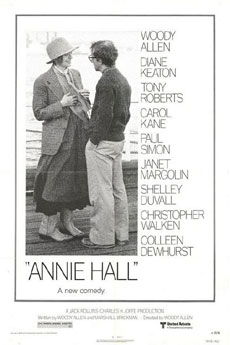As the movie opens, Alvy Singer (Allen), a character who seems a lot
like Allen himself, delivers a monologue to the camera. He tells the
viewers that he and Annie have just broken up, and he's trying to make
sense of their relationship. His self-deprecating monologue provides
some witty insight, the spirit of which carries throughout the film.
The relationship unfolds in front of our eyes, much the way that someone
reviewing a relationship might relive moments of their shared past.
First, we see the relationship's last days, with the couple squabbling
over seemingly minor things. Then we go back to the moment they first
met, their first date, and periodic highlights of their relationship.
It's not strictly chronological, jumping around between scenes that
are related thematically. By the end, the viewer has a good sense of
both why these people got together and why they can't stay together,
despite their feelings for each other.
When I first watched this film, about 15 years ago (as I remember,
in a hotel room with my mom on a family vacation), I thought it was
incredibly sad. Now that I am close to the age of the characters in
the film, however, I understand now what I didn't understand when I
first watched this film: that while it's possible for people to change,
that there are limits. I realize that sometimes you just have to make
peace with the fact that some relationships aren't meant to be. The
best you can do in those cases is to savor the good memories.
Back then, before my first marriage and divorce, I thought love could
conquer all. But now I realize that love is important, but you must
also have similar goals and a willingness to grow together. To get past
even minor difficulties, both parties have to agree to find a solution.
And that's what Annie and Alvy can't do.
They are very different people, from very different backgrounds, which
is clear from the start, thanks to a split screen of their two families
having dinner. While there is an initial attraction and they love each
other's company, eventually, those differences drive them apart. For
example, Annie feels intellectually inferior to him and accuses him
of treating her as if she's not as smart. The truth is, that's not something
he believes but is simply her own insecurity. He, on the other hand,
was raised by a highly-critical, argumentative family. Handing out compliments
is not his way. He's too absorbed with his own issues to give her much
support.
Through it all, they live through some simply magical moments, such
as the famous scene where they're trying to cook live lobsters, both
freaking out and yet laughing at the same time. Or when they first break
up, and she calls him over to kill a spider in her bathroom. He declares
it the size of a Buick and attacks it with a tennis racket.
One of the reasons I love this movie so much is because it takes a
creative approach to narrative. First of all, it tells the story out
of order. But also, it uses multiple techniques to get behind the thought
processes of Annie and Alvy. On their first date, for example, as they're
making small talk on a roof, subtitles reveal what they're really thinking.
In another scene, Alvy stops to ask passersby for advice about his relationship.
My favorite response, a couple who reveals the secret to their success
is that they are both shallow and empty, have no ideas and nothing interesting
to say.
This movie is so compelling because, while we may not all be a bundle
of neuroses like Alvy (and Annie), we all bring our own emotional baggage
to relationships. Like the characters in this film, what we say and
do is often miles apart from what we really think.
The title of the film is no accident, as the liner notes for the DVD
reminded me, showing the definition for "anhedonia," or the
inability to experience pleasure from normally pleasurable life events.
Anhedonia, in fact, was the original working title for the film.
The name Annie Hall (which ironically is also another name for
Keaton, whose real name is Diane Hall and whose nickname is Annie) is
evocative of that psychological condition. If you had asked me 15 years
ago, I would have said that Alvy suffers from anhedonia. Now, I believe
that both of them do. They both get in the way of their own happiness.
He's more obvious about it, because he's always complaining outwardly,
but she also tends to overthink situations and to sabotage herself.
Ironically, though, this funny and insightful look into relationships
is definitely enjoyable.


